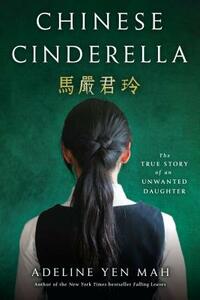Take a photo of a barcode or cover
This book is really good but also a tough read. The main character is subjected to so much abuse and neglect that it becomes heart wrenching and quite difficult to read about. But her story is also so powerful and so needed. There are, unfortunately, too many incidents of children being treated just like she was. It is sad and it is meant to be.
I also appreciated that she included snippets of Chinese throughout the book. I’m a language person and I always enjoy reading and studying about other languages. And I even picked up a few useful phrases. Read this at your own risk. If stories about children being beaten and abused are triggering for you, perhaps you should stay away from this one. For everyone else, go right ahead!
I also appreciated that she included snippets of Chinese throughout the book. I’m a language person and I always enjoy reading and studying about other languages. And I even picked up a few useful phrases. Read this at your own risk. If stories about children being beaten and abused are triggering for you, perhaps you should stay away from this one. For everyone else, go right ahead!
This autobiography was part of my daughter's summer reading for freshman English. She really liked it and thought I should read it.
I did like it for the most part...her stepmother, brothers, and father treated her horribly, and she managed to triumph and become successful, overcoming many obstacles. Her tone was a little overly sentimental and melodramatic in parts, but overall it was a good easy read that made me grateful for the family I have!
I did like it for the most part...her stepmother, brothers, and father treated her horribly, and she managed to triumph and become successful, overcoming many obstacles. Her tone was a little overly sentimental and melodramatic in parts, but overall it was a good easy read that made me grateful for the family I have!
This book was difficult to read, due to how she is treated, but marvellously written. The trials and torments she goes through are not told for shock value, or for pity, but just to show how things were. I would highly recommend this book.
It was an engaging story, no doubt, but her politeness and detachment served as a buffer between the reader and her horrible childhood.
challenging
dark
emotional
hopeful
inspiring
reflective
sad
tense
fast-paced
The author's shorter autobiography focusing on her young life, this is a quick read. Though I had already read a few of her other books, I was pleased to see that this didn't feel like a rehash, and that her additions of Chinese characters for important names (with the use of parentheses) were not overly intrusive; though I found myself wishing a bit for a clearer typeface. As someone with a BA in Japanese language, I was able to read them and infer the reasons they were there specifically--in particular when she retold the incident of her grandfather teaching her how Chinese characters are constructed by combining meanings of parts to make a whole (for example, 貧 meaning 'poor', and being constructed of the characters 分 and 貝; "fragment" and "shell" respectively; sadly, she did not break it down this far in the actual Chinese text, which would possibly confuse someone without a background in Chinese or Japanese, as the top radical comes off in the printing as smudged and unreadable).
However, as a story, it is engaging enough, and you do feel for young Adeline as she is completely rejected by not only her stepmother, but her father, siblings, and half-siblings. Though their hatred is taken to an extreme (Adeline's mother died in childbirth, thus all her brothers and sisters blame her for their mother's death--and the other half-siblings are taught by their mother that Adeline is worthless), it does not at all seem unbelievable or contrived, especially if one has read other accurate memoirs of the time period. Mah does not try to make her life interesting, she just tells things as they were, and how she felt; and though it is a short book, it has a resonance other books about Chinese daughters, even other memoirs, may not have.
However, as a story, it is engaging enough, and you do feel for young Adeline as she is completely rejected by not only her stepmother, but her father, siblings, and half-siblings. Though their hatred is taken to an extreme (Adeline's mother died in childbirth, thus all her brothers and sisters blame her for their mother's death--and the other half-siblings are taught by their mother that Adeline is worthless), it does not at all seem unbelievable or contrived, especially if one has read other accurate memoirs of the time period. Mah does not try to make her life interesting, she just tells things as they were, and how she felt; and though it is a short book, it has a resonance other books about Chinese daughters, even other memoirs, may not have.
Putting aside the intensely sad subject of the book, I really didn’t think it was good memoir overall. I empathize with the author’s trauma and horrible upbringing and I do understand the idea of emulating a little girl's memories with the simplistic writing, but I couldn't help but be annoyed by the tone. Yes, the neglect suffered by the author is unthinkable, but she comes out very self-pitying by only retelling the most sad and negative things that ever happened to her, without adding self-reflection to any of it. It’s like being trauma-dumped by your grandma for hours, all so she can conclude by a cheerful : “but I came through in the end, didn’t I?”. I would’ve preferred a more mature and reflective approach.
I didn't enjoy the writing style which was really basic and resembled the way that I suppose a twelve year old would write.
The story itself was really painful to read because you felt so sorry for Adeline knowing there must be thousands of children even nowadays who are still treated as poorly as the author was. Those kids will find comfort in these pages realising they are not alone and worthy of a good life no matter what their families might tell them.
It was also very enlightening that the Cinderella story actually is "imported" from China. In my, I confess, closed mind set I always thought it to be a European/German fairy tale.
I don't know whether I will read her other autobiography due to the disappointing writing style but the Postscript somehow got me hooked about her adult life.
The story itself was really painful to read because you felt so sorry for Adeline knowing there must be thousands of children even nowadays who are still treated as poorly as the author was. Those kids will find comfort in these pages realising they are not alone and worthy of a good life no matter what their families might tell them.
It was also very enlightening that the Cinderella story actually is "imported" from China. In my, I confess, closed mind set I always thought it to be a European/German fairy tale.
I don't know whether I will read her other autobiography due to the disappointing writing style but the Postscript somehow got me hooked about her adult life.
(I read this because it's Zach's assigned reading for the summer.)
I had a hard time deciding what to rate this book.
My initial reaction was to give it less than 3 stars because I found the writing to be generally awkward. That is my main complaint about this book, similar to "Who Fears Death?" This was written as a children's book and is told from the point of view of the author as a child, so maybe the way she thought she should convey the story to her audience just didn't work for me. However that thought just made me think of something I recently read (possibly written by Patrick Rothfuss?) about how writing a book for children doesn't excuse poor writing.
Then I read through other low reviews and got very angry about how the main complaint is that she's a rich, whiny girl who doesn't know how good she had it. Did these people read the same book as I did? The author very obviously suffered emotional and physical abuse from her stepmother and father; what does it matter that she was still able to go to school, that she wasn't starving out on the streets? These facts do not invalidate what she suffered. One of these commenters did give some context for this scorn — that strict upbringing and corporal punishment were the norm and daughters were less desired in China, so really her story could have been told by countless other girls who didn't enjoy any of the privileges that she did. And to the commenters who can't believe how she so desperately wants affection and approval from her abusers, who say this makes her pathetic and an unbelievable character, I say be *very* thankful that you don't understand.
So that bit there made me feel like I should leave a higher rating, because clearly her story resonated with me in some way. That said, I think I'll stick with my 2 stars, because while it's important for stories like this to be told and heard, I'm sure it could be (and has been) done in a way that isn't so awkward for me to read.
I had a hard time deciding what to rate this book.
My initial reaction was to give it less than 3 stars because I found the writing to be generally awkward. That is my main complaint about this book, similar to "Who Fears Death?" This was written as a children's book and is told from the point of view of the author as a child, so maybe the way she thought she should convey the story to her audience just didn't work for me. However that thought just made me think of something I recently read (possibly written by Patrick Rothfuss?) about how writing a book for children doesn't excuse poor writing.
Then I read through other low reviews and got very angry about how the main complaint is that she's a rich, whiny girl who doesn't know how good she had it. Did these people read the same book as I did? The author very obviously suffered emotional and physical abuse from her stepmother and father; what does it matter that she was still able to go to school, that she wasn't starving out on the streets? These facts do not invalidate what she suffered. One of these commenters did give some context for this scorn — that strict upbringing and corporal punishment were the norm and daughters were less desired in China, so really her story could have been told by countless other girls who didn't enjoy any of the privileges that she did. And to the commenters who can't believe how she so desperately wants affection and approval from her abusers, who say this makes her pathetic and an unbelievable character, I say be *very* thankful that you don't understand.
So that bit there made me feel like I should leave a higher rating, because clearly her story resonated with me in some way. That said, I think I'll stick with my 2 stars, because while it's important for stories like this to be told and heard, I'm sure it could be (and has been) done in a way that isn't so awkward for me to read.






